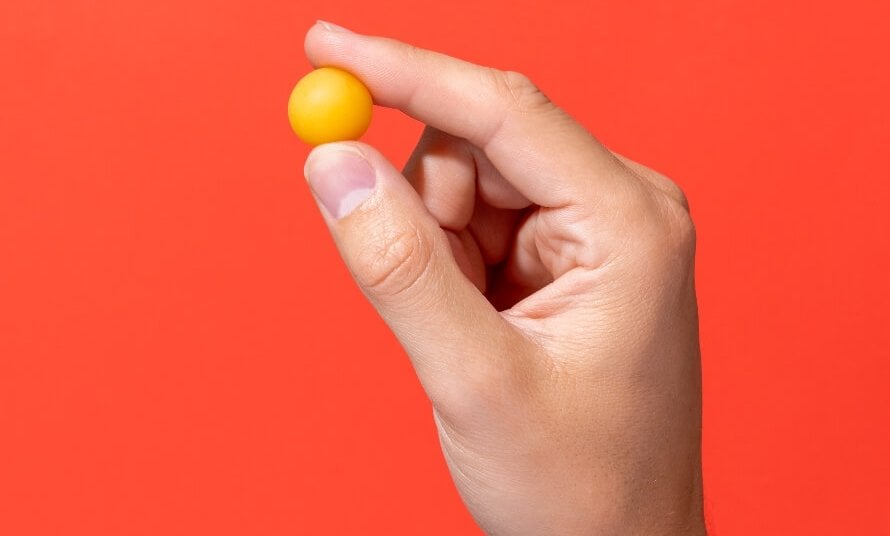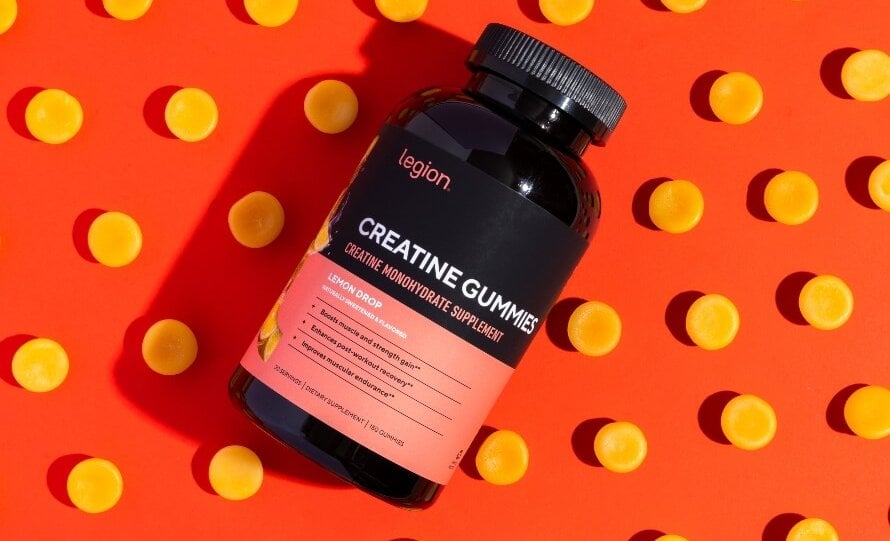Creatine is the undisputed king of muscle-building supplements.
But let’s be honest—chugging a gritty drink every day gets old fast.
That’s why supplement companies have spent years creating more enjoyable ways to take it.
One popular new option is creatine gummies—sweet, chewable “treats” that deliver your daily dose of creatine monohydrate in a tasty, convenient way.
But because creatine monohydrate gummies taste so good, many people wonder if they can really be as effective as traditional powder.
Is this skepticism misplaced? Are creatine gummies as good as powder? Or do they sacrifice effectiveness for flavor?
In this article, we’ll compare creatine gummies vs. powder, break down their differences, weigh the pros and cons, and help you decide which option is best for you.
Table of Contents
+
What Is Creatine?
Creatine is a naturally occurring compound found in human and animal muscle composed of the amino acids L-arginine, glycine, and methionine.
Your kidneys and liver produce creatine, and you can also absorb it from foods like red meat, fish, and eggs. Your body stores this creatine in your muscles, where it helps generate adenosine triphosphate (ATP), the primary source of cellular energy.
Creatine supplements are popular among athletes and gymgoers because they have numerous muscle-building and performance-enhancing benefits. Specifically, supplementing with creatine:
- Boosts strength and power
- Kickstarts muscle protein synthesis
- Accelerates muscle growth
- Improves anaerobic endurance
- Enhances muscle recovery
- Preserves muscle and strength while dieting
- Increases the amount of glycogen your muscles store
What Are Creatine Gummies?

Creatine gummies are a dietary supplement that provide creatine (usually creatine monohydrate) in a chewable, gummy form.
They offer the same performance-enhancing benefits as traditional creatine powders that you mix with liquid and drink, making them a convenient and tasty alternative.
As well as creatine monohydrate, gummies also typically contain flavorings, colorings, sweeteners (natural or artificial), and gelling agents for texture.
The best creatine gummies contain 3-to-5 grams of creatine, which is the amount shown by research to deliver the most benefits. However, some lower-quality products may contain less, so it’s important to check the label when choosing a product.
Creatine Gummies vs. Powder: Key Differences
While both creatine gummies and powder offer the same performance-enhancing and muscle-building benefits, they differ in a few important ways.
Let’s discuss these key differences so you can choose the best option for your goals and preferences.
Convenience
One of the main benefits of creatine gummies is their convenience. You don’t need to measure out each serving or mix them with liquid—just pop a few in your mouth, chew them up, and you’re done.
This minimizes mess and makes them ideal for taking on the go.
Because they’re “pre-dosed,” you can also be sure you always get the correct amount of creatine (provided you eat the right number of gummies), which is important for maximizing its benefits.
On the other hand, creatine powder requires more preparation, but it’s usually tasteless and can be mixed with anything, so it’s easy to combine with other drinks and supplements.
Taste and Texture
Many people don’t enjoy drinking creatine powder. Even flavorless creatine can have an unpleasant, gritty texture.
And if you don’t like the taste or feel of what you’re consuming, it increases the odds you’ll skip doses. This can be a problem with creatine since you need to take it daily to get the full benefit.
One of creatine gummies’ benefits is that the taste and mouthfeel is similar to candy, so they’re enjoyable to eat. In fact, people tend to look forward to taking creatine gummies, which can make sticking to your supplement regimen more straightforward.
Dietary Preferences
For those with dietary restrictions, gummies aren’t always the best choice. They often contain sugar, artificial sweeteners, or other ingredients that you may prefer to avoid.
Additionally, many gummies contain gelatin, which isn’t suitable for vegans or vegetarians.
Pure creatine powder doesn’t contain these ingredients and may be a better option for people following stricter diet plans.
Price
Because creatine gummies contain more ingredients and go through a more complex production process, they tend to cost more than creatine powder.
While this may be off-putting for some, bear in mind that gummies can help you stay consistent with your daily creatine intake. And if they do this for you, the extra expenditure may be worth it.
Dosage Flexibility
One downside of creatine gummies is they have a fixed amount of creatine per gummy, so they offer limited flexibility when it comes to dosage.
For example, if you want to take a larger dose of creatine (while “loading” or to benefit from the potential cognitive benefits, for example) you may have to take a few handfuls of gummies, which could mean you have to consume extra unwanted calories, sugar, or additives.
In contrast, creatine powder gives you complete control over your dosage, allowing you to consume the exact amount you want in every serving.
Are Creatine Gummies or Powder Right for You?

Deciding between creatine gummies and powder depends on your personal preferences. Both forms deliver the same benefits, but certain factors may make one option better suited for you.
For instance, if you want a quick, convenient, mess-free supplement, creatine gummies may be the best choice. They’re easy to take on the go, require no mixing or measuring, and taste like candy, which can make eating your daily dose enjoyable.
Plus, if you struggle to take creatine every day, gummies may help you stick to your supplement regimen more consistently.
On the other hand, if you’re looking for a cost-effective creatine supplement, creatine powder is likely a better option.
As well as being cheaper, powders allow you to control your intake more precisely, which can be beneficial in some scenarios.
Powder is also a better choice if you want to avoid the added sugars, sweeteners, or gelatin often found in gummies.
Creatine Gummies Side Effects
Taking creatine is largely safe, even in high doses (up to 30 grams daily) over many years.
Despite what some people say, there’s no proof it leads to acne, headaches, or increased blood pressure. It also doesn’t negatively affect sleep quality, almost certainly doesn’t cause hair loss, and won’t harm your kidneys if they’re healthy.
Taking high doses of creatine can cause digestive discomfort in people with sensitive stomachs. However, since most people only take 3-to-5 grams per serving when using creatine gummies, this usually isn’t a major concern.
You may also gain weight while taking creatine.
Creatine causes weight gain because it draws water into your muscles, temporarily increasing your body weight.
Crucially, water retention from creatine is not the same as gaining fat. It has no negative impact on your overall health or body composition, so you shouldn’t view it as a downside. It also won’t meaningfully impact how you look and may help you build muscle faster.
What Are the Best Creatine Gummies?

When it comes to choosing the best creatine gummies, most people want a product that . . .
- Is free of artificial ingredients and unnecessary additives
- Contains no animal products like gelatin
- Provides a scientifically backed dose of creatine
- Tastes great
If you want a supplement that meets all these criteria, try Legion Creatine Gummies.
Each serving contains 5 grams of pure creatine monohydrate with no artificial fillers, food dyes, or other chemical junk.
They’re naturally sweetened and flavored, and every batch is tested for purity and potency in a state-of-the-art ISO 17025 accredited lab.
(Or, if you aren’t sure if Legion Creatine Gummies are right for you or if another supplement might better fit your budget, circumstances, and goals, then take the Legion Supplement Finder Quiz! In less than a minute, it’ll tell you exactly what supplements are right for you. Click here to check it out.)
FAQ #1: Do creatine gummies work?
Yes, provided they contain the recommended 3-to-5 grams of creatine monohydrate per serving, creatine gummies are effective for boosting athletic performance, muscle growth, and recovery.
Just like creatine powder, gummies boost ATP production in your body, which helps you lift heavier weights, build muscle faster, and recover more effectively after workouts.
FAQ #2: Are creatine gummies as good as powder?
Yes, creatine gummies can be just as effective as creatine powder, assuming you take an equivalent dose of creatine.
Both forms deliver the same key benefits: increased strength, muscle mass, endurance, and recovery.
The main differences come down to personal preference—whether you prefer the convenience and taste of gummies or the flexibility and cost-effectiveness of powder.
FAQ #3: How many creatine gummies should I take a day?
The exact number of gummies depends on how much creatine is in each gummy. If each gummy contains 1 gram of creatine, for example, you’d need to take 3-to-5 gummies per day to hit the daily recommended dose of 3-to-5 grams of creatine monohydrate.
In the case of Legion Creatine Gummies, a serving size is five gummies per day.
FAQ #4: Are creatine gummies safe?
Yes, creatine gummies are safe, even when you take large doses for long periods.
Some users may experience mild bloating or stomach discomfort, but this is rare, especially if you stick to the recommended 3-to-5 grams per day.
Scientific References +
- Cooper, Robert, et al. “Creatine Supplementation with Specific View to Exercise/Sports Performance: An Update.” Journal of the International Society of Sports Nutrition, vol. 9, no. 1, 20 July 2012, pp. 1–11, www.ncbi.nlm.nih.gov/pmc/articles/PMC3407788/, https://doi.org/10.1186/1550-2783-9-33.
- Volek, Jeff S., et al. “The Effects of Creatine Supplementation on Muscular Performance and Body Composition Responses to Short-Term Resistance Training Overreaching.” European Journal of Applied Physiology, vol. 91, no. 5-6, 1 May 2004, pp. 628–637, https://doi.org/10.1007/s00421-003-1031-z.
- Farshidfar, Farnaz, et al. “Creatine Supplementation and Skeletal Muscle Metabolism for Building Muscle Mass- Review of the Potential Mechanisms of Action.” Current Protein & Peptide Science, vol. 18, no. 12, 9 Oct. 2017, https://doi.org/10.2174/1389203718666170606105108.
- Jd, Branch. “Effect of Creatine Supplementation on Body Composition and Performance: A Meta-Analysis.” International Journal of Sport Nutrition and Exercise Metabolism, 1 June 2003, pubmed.ncbi.nlm.nih.gov/12945830/.
- Eckerson, Joan M., et al. “Effect of Creatine Phosphate Supplementation on Anaerobic Working Capacity and Body Weight after Two and Six Days of Loading in Men and Women.” The Journal of Strength and Conditioning Research, vol. 19, no. 4, 2005, p. 756, https://doi.org/10.1519/r-16924.1.
- ROCKWELL, JOHN A., et al. “Creatine Supplementation Affects Muscle Creatine during Energy Restriction.” Medicine and Science in Sports and Exercise, Jan. 2001, pp. 61–68, https://doi.org/10.1097/00005768-200101000-00011.
- NELSON, ARNOLD G., et al. “Muscle Glycogen Supercompensation Is Enhanced by Prior Creatine Supplementation.” Medicine and Science in Sports and Exercise, July 2001, pp. 1096–1100, https://doi.org/10.1097/00005768-200107000-00005. Accessed 8 Mar. 2020.
- Kreider, Richard B., et al. “International Society of Sports Nutrition Position Stand: Safety and Efficacy of Creatine Supplementation in Exercise, Sport, and Medicine.” Journal of the International Society of Sports Nutrition, vol. 14, no. 1, 13 June 2017, https://doi.org/10.1186/s12970-017-0173-z.
- Lester, S. , et al. Factors Affecting Adherence, Intake, and Perceived Palatability of Oral Nutritional Supplements: A Literature Review. 27 June 2022, pp. 663–674, www.sciencedirect.com/science/article/pii/S1279770723008321?via%3Dihub, https://doi.org/10.1007/s12603-022-1819-3.
- Vojvodić Cebin, Aleksandra, et al. “Physicochemical and Sensory Stability Evaluation of Gummy Candies Fortified with Mountain Germander Extract and Prebiotics.” Polymers, vol. 16, no. 2, 1 Jan. 2024, p. 259, www.mdpi.com/2073-4360/16/2/259, https://doi.org/10.3390/polym16020259. Accessed 19 Jan. 2024.
- Kreider, Richard B., et al. “International Society of Sports Nutrition Position Stand: Safety and Efficacy of Creatine Supplementation in Exercise, Sport, and Medicine.” Journal of the International Society of Sports Nutrition, vol. 14, no. 1, 13 June 2017, https://doi.org/10.1186/s12970-017-0173-z.
- MIHIC, SASA, et al. “Acute Creatine Loading Increases Fat-Free Mass, but Does Not Affect Blood Pressure, Plasma Creatinine, or CK Activity in Men and Women.” Medicine & Science in Sports & Exercise, vol. 32, no. 2, Feb. 2000, p. 291, https://doi.org/10.1097/00005768-200002000-00007.
- van der Merwe, Johann, et al. “Three Weeks of Creatine Monohydrate Supplementation Affects Dihydrotestosterone to Testosterone Ratio in College-Aged Rugby Players.” Clinical Journal of Sport Medicine, vol. 19, no. 5, Sept. 2009, pp. 399–404, https://doi.org/10.1097/jsm.0b013e3181b8b52f.
- Carvalho, Ana Paula Perillo Ferreira, et al. “Suplementação Com Creatina Associada Ao Treinamento Resistido Não Altera as Funções Renal E Hepática.” Revista Brasileira de Medicina Do Esporte, vol. 17, no. 4, Aug. 2011, pp. 237–241, https://doi.org/10.1590/s1517-86922011000400004.
- Davani-Davari, Dorna, et al. “Potential Adverse Effects of Creatine Supplement on the Kidney in Athletes and Bodybuilders.” Iranian Journal of Kidney Diseases, vol. 12, no. 5, 1 Oct. 2018, pp. 253–260, pubmed.ncbi.nlm.nih.gov/30367015/.










